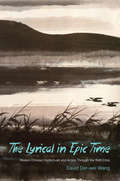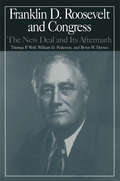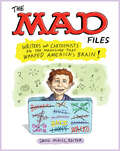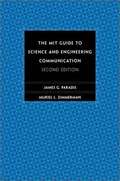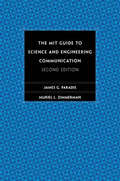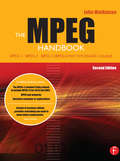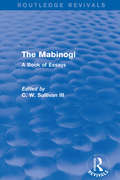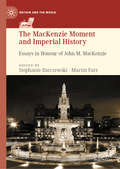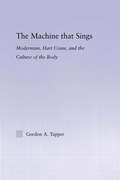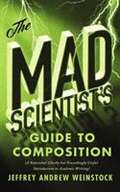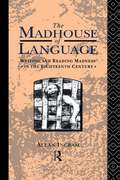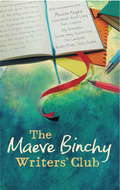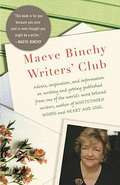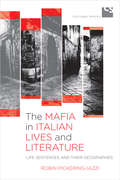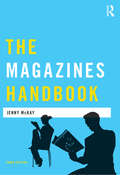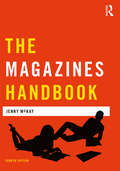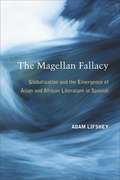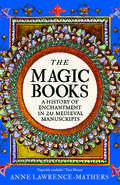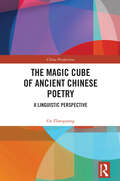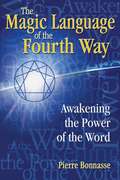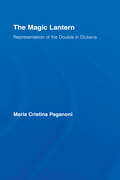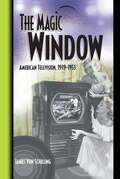- Table View
- List View
The Lyric in the Age of the Brain
by Nikki SkillmanScience has transformed understandings of the mind, supplying physiological explanations for what once seemed transcendental. Nikki Skillman shows how lyric poets--caught between a reductive scientific view and naïve literary metaphors--struggled to articulate a vision of consciousness that was both scientifically informed and poetically truthful.
The Lyrical in Epic Time
by David Der-Wei WangThis book positions the lyrical as key to rethinking the dynamics of Chinese modernity and emphasizes Chinese lyricism's deep roots in its own native traditions
The Lyrical in Epic Time: Modern Chinese Intellectuals and Artists Through the 1949 Crisis
by David Der-wei WangIn this book, David Der-wei Wang uses the lyrical to rethink the dynamics of Chinese modernity. Although the form may seem unusual for representing China's social and political crises in the mid-twentieth century, Wang contends that national cataclysm and mass movements intensified Chinese lyricism in extraordinary ways. Wang calls attention to the form's vigor and variety at an unlikely juncture in Chinese history and the precarious consequences it brought about: betrayal, self-abjuration, suicide, and silence. Despite their divergent backgrounds and commitments, the writers, artists, and intellectuals discussed in this book all took lyricism as a way to explore selfhood in relation to solidarity, the role of the artist in history, and the potential for poetry to illuminate crisis. They experimented with poetry, fiction, film, intellectual treatise, political manifesto, painting, calligraphy, and music. Western critics, Wang shows, also used lyricism to critique their perilous, epic time. He reads Martin Heidegger, Theodor Adorno, Cleanth Brooks, and Paul de Man, among others, to complete his portrait.The Chinese case only further intensifies the permeable nature of lyrical discourse, forcing us to reengage with the dominant role of revolution and enlightenment in shaping Chinese—and global—modernity. Wang's remarkable survey reestablishes Chinese lyricism's deep roots in its own native traditions, along with Western influences, and realizes the relevance of such a lyrical calling of the past century to our time.
The M.E.Sharpe Library of Franklin D.Roosevelt Studies: Franklin D.Roosevelt and Congress - The New Deal and it's Aftermath (Library Of Franklin D. Roosevelt Studies #Vol. 2)
by William D. Pederson Byron W. Daynes Nancy Beck YoungThis book assesses contrasting interpretations of President Roosevelt's relations with the Nye Committee. It explores the complexity confronting Rayburn in weighing the factors that influenced his actions during the New Deal portion of his near half century in Congress.
The MAD Files: Writers and Cartoonists on the Magazine that Warped America's Brain!
Celebrate America's zaniest and most subversive magazine in 26 essays and comix from all-star contributors, including Roz Chast, Jonathan Lethem, and Grady Hendrix.Before SNL and the wise-guy sarcasm of Letterman and Colbert, before The Simpsons and online memes, there was . . . MAD.A mainstay of countless American childhoods, MAD magazine exploded onto the scene in the 1950s and gleefully thumbed its nose at all the postwar pieties. MAD became the zaniest, most subversive satire magazine ever to be sold on America&’s newsstands, anticipating the spirit of underground comix and &’zines and influencing humor writing in movies, television, and the internet to this day.Edited by David Mikics, The MAD Files celebrates the magazine&’s impact and the legacy of the Usual Gang of Idiots who transformed puerile punchlines and merciless mockery into an art form. 26 essays and comics present a varied, perceptive, and often very funny account of MAD&’s significance, ranging from the cultural to the aesthetic to the personal.Art Spiegelman reflects on how he &“couldn&’t learn much about America from my refugee immigrant parents—but I learned all about it from MAD&”Roz Chast remembers how the magazine was &“love at first sight. . . . It was one of my first inklings that there were other people out there who found the world as ridiculous as I did.&”David Hajdu and Grady Hendrix zero in on MAD&’s hilarious movie spoofsLiel Leibovitz delves into the Jewishness behind the magazine&’s humorand Rachel Shteir amplifies the often unsung contributions of MAD&’s women artists.Several essays are admiring profiles of the individual creators that made MAD what it was: Mort Drucker, Harvey Kurtzman, Al Jaffee, Antonio Prohias, and Will Elder. For longtime fans and new readers alike, The MAD Files is an indispensable guide to America&’s greatest satire magazine.
The MIT Guide to Science and Engineering Communication (Second Edition)
by James G. Paradis Muriel L. ZimmermanThis guide covers the basics of scientific and engineering communication, including defining an audience, working with collaborators, searching the literature, organizing and drafting documents, developing graphics, and documenting sources.
The MIT Guide to Science and Engineering Communication, second edition
by James Paradis Muriel ZimmermanA second edition of a popular guide to scientific and technical communication, updated to reflect recent changes in computer technology.This guide covers the basics of scientific and engineering communication, including defining an audience, working with collaborators, searching the literature, organizing and drafting documents, developing graphics, and documenting sources. The documents covered include memos, letters, proposals, progress reports, other types of reports, journal articles, oral presentations, instructions, and CVs and resumes. Throughout, the authors provide realistic examples from actual documents and situations. The materials, drawn from the authors' experience teaching scientific and technical communication, bridge the gap between the university novice and the seasoned professional. In the five years since the first edition was published, communication practices have been transformed by computer technology. Today, most correspondence is transmitted electronically, proposals are submitted online, reports are distributed to clients through intranets, journal articles are written for electronic transmission, and conference presentations are posted on the Web. Every chapter of the book reflects these changes. The second edition also includes a compact Handbook of Style and Usage that provides guidelines for sentence and paragraph structure, punctuation, and usage and presents many examples of strategies for improved style.
The MPEG Handbook
by John WatkinsonA complete, professional 'bible' on all aspects of audio and video compression using MPEG technology, including the MPEG-4 standard and, in this second edition, H-264. The clarity of explanation and depth of technical detail combine to make this book an essential and definitive reference work.THE MPEG HANDBOOK is both a theoretical and practical treatment of the subject. Fundamental knowledge is provided alongside practical guidance on how to avoid pitfalls and poor quality. The often-neglected issues of reconstructing the signal timebase at the decoder and of synchronizing the signals in a multiplex are treated fully here.Previously titled MPEG-2, the book is frequently revised to cover the latest applications of the technology.
The Mabinogi: A Book of Essays (Routledge Revivals)
by C. W. Sullivan IIIThe purpose of this collection, which was first published in 1996, is to provide both an overview of the major critical approaches to the Four Branches of the Mabinogi and a selection of the best essays dealing with them. The essays examine the origins of the Mabinogion, comparative analyses, and structural and thematic interpretations. This book is ideal for students of literature and Medieval studies.
The MacKenzie Moment and Imperial History: Essays in Honour of John M. MacKenzie (Britain and the World)
by Stephanie Barczewski Martin FarrThis book celebrates the career of the eminent historian of the British Empire John M. MacKenzie, who pioneered the examination of the impact of the Empire on metropolitan culture. It is structured around three areas: the cultural impact of empire, 'Four-Nations' history, and global and transnational perspectives. These essays demonstrate MacKenzie’s influence but also interrogate his legacy for the study of imperial history, not only for Britain and the nations of Britain but also in comparative and transnational context. Written by seventeen historians from around the world, its subjects range from Jumbomania in Victorian Britain to popular imperial fiction, the East India Company, the ironic imperial revivalism of the 1960s, Scotland and Ireland and the empire, to transnational Chartism and Belgian colonialism. The essays are framed by three evaluations of what will be known as 'the MacKenzian moment' in the study of imperialism.
The Machine that Sings: Modernism, Hart Crane and the Culture of the Body (Studies in Major Literary Authors #21)
by Gordon A. TapperExamining how Crane's corporeal aesthetic informs poems written across the span of his career, The Machine That Sings focuses on four texts in which Crane's preoccupation with the body reaches its apoge. Tapper treats Voyages, The Wine Merchant, and Possessions as a triptych of erotic poems in which Crane plays out alternative resolutions to the dialectic between purity and defilement, a conceptual dynamic which Tapper argues is central to both Crane's poetics of difficulty and his representations of homosexual desire. Tapper concentrates on the three sections of The Bridge, most concerned with recuperating animality: 'National Winter Garden,' 'The Dance,' and 'Cape Hatteras.'
The Mad Scientist's Guide to Composition: A Somewhat Cheeky but Exceedingly Useful Introduction to Academic Writing: Now with 100% More Monsters!
by Jeffrey Andrew WeinstockConsidering the composition classroom as a mad scientist’s laboratory, The Mad Scientist’s Guide to Composition introduces different kinds of writing as experiments. Writing an essay is a task that can strike fear into a student’s heart, but performing an experiment licenses creativity and doesn’t presume that one knows the outcome from the start. The Mad Scientist’s Guide covers the kinds of writing most often required on college campuses, while also addressing important steps and activities frequently overlooked in composition guides, such as revision and peer reviewing. Actual examples of student writing are included throughout, as are helpful reminders and tips to help students polish their skills. Above all, the Mad Scientist’s Guide seeks to make writing fun.
The Madhouse of Language: Writing and Reading Madness in the Eighteenth Century
by Allan IngramLanguage has always been used as a measure of social, ideological, and psychological contexts for the exploration of madness. The Madhouse of Language considers the relations between madness and language from the late seventeenth to early nineteenth centuries, focusing on the close analysis of both medical records and texts by mad writers. It presents a highly original account of the linguistic relations between madness and sanity, of the appropriation by sane writers of the forms of English, and of attempts by mad patients to gain access to the expressive potential of language.
The Maeve Binchy Writers' Club
by Maeve BinchyFascinating and informative - advice to inspire budding writers as well as entertaining Maeve Binchy fans the world over.'The most important thing to realise is that everyone is capable of telling a story. It doesn't matter where we were born or how we grew up' Maeve BinchyTHE MAEVE BINCHY WRITERS' CLUB gives a unique insight into how a No. 1 bestselling author writes. Inspired by a course run by the National College of Ireland, it comprises twenty letters from Maeve offering advice, tips and her own wonderfully witty take on the life of a writer, in addition to contributions from top writers, publishers and editors.Whether you want to write a saga or a thriller, comedy or journalism, or write for the radio or stage, the book also gives advice on the best way to get started, and what editors, publishers and agents are looking for.
The Maeve Binchy Writers' Club
by Maeve BinchyFascinating and informative - advice to inspire budding writers as well as entertaining Maeve Binchy fans the world over.'The most important thing to realise is that everyone is capable of telling a story. It doesn't matter where we were born or how we grew up' Maeve BinchyTHE MAEVE BINCHY WRITERS' CLUB gives a unique insight into how a No. 1 bestselling author writes. Inspired by a course run by the National College of Ireland, it comprises twenty letters from Maeve offering advice, tips and her own wonderfully witty take on the life of a writer, in addition to contributions from top writers, publishers and editors.Whether you want to write a saga or a thriller, comedy or journalism, or write for the radio or stage, the book also gives advice on the best way to get started, and what editors, publishers and agents are looking for.
The Maeve Binchy Writers’ Club
by Maeve Binchy'The most important thing to realise is that everyone is capable of telling a story. It doesn't matter where we were born or how we grew up?' Maeve Binchy. The Maeve Binchy Writers' Club gives a unique insight into how a No. 1 bestselling author writes. Inspired by a course run by the National College of Ireland, it comprises 20 letters from Maeve, offering advice, tips and her own wonderfully witty take on the life of a writer, in addition to contributions from top writers, publishers and editors. Whether you want to write a saga or a thriller, comedy or journalism, or write for the radio or stage, this also gives advice on the best way to get started, and what editors, publishers and agents are looking for. The Maeve Binchy Writers' Club is a fascinating and informative guide to inspire all budding writers as well as entertaining Maeve Binchy fans the world over.
The Mafia in Italian Lives and Literature
by Robin Pickering-IazziUsing an array of cultural documents from 1990 to the present, including diaries, testimonies, fiction, online video postings, and anti-mafia social networks, Robin Pickering-Iazzi examines the myths, values, codes of behaviour, and relationships produced by the Italian mafia through a wide cross-disciplinary lens. The Mafia in Italian Lives and Literature explores the ways that these literary engagements with the mafia relate to broader contemporary Italian life and offer implicit challenges, and a quiet code of resistance, to the trauma and injustice wrought by the mafia in various Italian cities.Despite the long tradition of representing the mafia in Italian literature, until now women's contributions to this literature have been overlooked. Pickering-Iazzi's aim is to encourage new critical reflection on a broader selection of literature through new theoretical lenses in order to enrich our understanding of crime fiction, Sicily and Sicilian identity in literature, narrative traits of the new Italian epic, and the cultural and social functions of storytelling in life and literature.
The Magazines Handbook
by Jenny McKayThe Magazines Handbook has firmly established itself as the essential introduction to the theories and practices of the modern magazine industry. This fully updated third edition comprehensively examines the business of publishing magazines today and the work of the contemporary magazine journalist. Jenny McKay draws examples from a broad range of publications to explore key jobs in the industry, covering everyone from the sub editor to the fashion assistant, as well as analysing the many skills involved in magazine journalism, including commissioning, researching, interviewing, and production. Updated specialist chapters discuss the growth and development of electronic publishing and online journalism, new directions in magazine design, photography and picture editing, and the most up to date legal frameworks in which magazine journalists must operate. The Magazines Handbook includes: • Interviews with magazine journalists, editors, and publishers • Advice on starting out and freelancing in the magazine industry • An analysis of ‘new journalism’ and reportage • A glossary of key terms and specialist concepts • Information on contacts, courses and professional training.
The Magazines Handbook (Media Practice)
by Jenny McKayThe Magazines Handbook is an introductory guide to all aspects of magazine journalism and publishing. The book explores the latest innovations in digital design and delivery, whilst also reaffirming the continued importance of key journalistic skills, including good interviewing, feature writing and news writing. The book includes chapters on the visual aspects of magazines, such as illustration and picture editing, and chapters covering the business background of this increasingly global industry. Jenny McKay offers tips on training and work experience as well as outlining the function of various editorial jobs. Profiles of four young journalists give a flavour of life in the early years of a career. Chapters include: advice on embarking on a career in magazine journalism; an overview of magazine design and the production process; analysis of the state of the magazine industry today, with a look to its future; a discussion of legal issues related to magazine journalism; a glossary of key terms and recommended reading in every chapter. Now in its fourth edition, The Magazines Handbook offers a nuanced and reflective account of periodical journalism, ideal for students of journalism and budding professionals who are seeking a useful starting point for wide-ranging academic discussion about magazines.
The Magellan Fallacy: Globalization and the Emergence of Asian and African Literature in Spanish
by Adam LifsheyThe Magellan Fallacy argues that literature in Spanish from Asia and Africa, though virtually unknown, reimagines the supposed centers and peripheries of the modern world in fundamental ways. Through archival research and comparative readings, The Magellan Fallacy rethinks mainstream mappings of diverse cultures while advocating the creation of a new field of scholarship: global literature in Spanish. As the first attempt to analyze Asian and African literature in Spanish together, and doing so while ranging over all continents, The Magellan Fallacy crosses geopolitical and cultural borders without end. The implications of the book, therefore, extend far beyond the lands formerly ruled by the Spanish empire. The Magellan Fallacy shows that all theories of globalization, including those focused on the Americas and Europe, must be able to account for the varied significances of hispanophone Asia and Africa as well.
The Magic Books: A History of Enchantment in 20 Medieval Manuscripts
by Anne Lawrence-MathersA fascinating and highly original history of medieval magic told through twenty key illuminated manuscripts Medieval Europe was preoccupied with magic. From the Carolingian Empire to Renaissance Italy and Tudor England, great rulers, religious figures, and scholars sought to harness supernatural power. They tried to summon spirits, predict the future, and even prolong life. Alongside science and religion, magic lay at the very heart of culture. In this beautifully illustrated account, Anne Lawrence-Mathers explores the medieval fascination with magic through twenty extraordinary illuminated manuscripts. These books were highly sought after, commissioned by kings and stored in great libraries. They include an astronomical compendium made for Charlemagne&’s son; The Sworn Book of Honorius, used by a secret society of trained magicians; and the highly influential Picatrix. This vivid new history shows how attitudes to magic and science changed over the medieval period—and produced great works of art as they did so.
The Magic Cube of Ancient Chinese Poetry: A Linguistic Perspective (China Perspectives)
by Ge ZhaoguangThis book focuses on the linguistic perspective of classical Chinese poetry and its changes and development in diff erent historical periods. It off ers a combination of theoretical analysis and aesthetic appreciation of exemplary poems. The author discusses the following aspects of classical Chinese poetry: the relationships between background and meaning in the interpretation of a poem; how readers can deal with the tangle of linguistic approach and intuitive perception in interpreting poems; the engagement and disengagement of the poet’s thought fl ow with and from the word order of the verse; the tonal and metrical schemes; and the three special features of classical Chinese poetry: the signifi cance and role of allusions, “Xu Zi”, and “Shi Yan”. Last, the author analyses the development of Chinese poetry from the Vernacular Song Dynasty Style to the Vernacular Modern Style. It will be a great read for students and scholars of East Asian studies, Chinese studies, linguistics, and those interested in Chinese poetry in general. The book aims to lead readers to discover a fresh and amazing world of classical Chinese poetry, a fantastic panoramic picture of its beauty and charm, and a poetic feast that the reader may not otherwise be privileged to enjoy.
The Magic Language of the Fourth Way: Awakening the Power of the Word
by Pierre BonnasseAn application of Gurdjieffian principles to fully and properly activate the power of language • Explains the relationship between the Gurdjieff enneagram and sacred geometry and harmonics • Shows that the objective power of language--and art and music--lies in the ability to use symbols that will mean precisely the same thing to anyone • Includes a new English translation of René Daumal’s essay “The Holy War” In The Magic Language of the Fourth Way, Pierre Bonnasse applies the esoteric teachings of Fourth Way mystic G. I. Gurdjieff and the insights of initiate René Daumal to show how to fully and properly activate the power of language. Bonnasse shows how words can regain the strange magical powers they possessed in the first days of humanity, when words created the realities of what they described. This is a far cry from today’s world in which even writers lament the impotent nature of language.Bonnasse uses the relationship between the Gurdjieff enneagram and sacred geometry and harmonics to reveal the power given to words by the notes of the scale. He shows not only how to discover the objective power of words but also how to apply the relationship between language and living to maximum effect. He explains that the objective power of language--and art and music--lies in the ability to use symbols that will mean precisely the same thing to anyone. The Magic Language of the Fourth Way serves as a clear and generous introduction to the complexities of Gurdjieffian thought as well as a descriptive how-to manual for Fourth Way aspirants on the uses of objective language for spiritual advancement.
The Magic Lantern: Representations of the Double in Dickens (Studies in Major Literary Authors)
by Maria Cristina PaganoniThe book provides an original investigation of the double trope as a central area of Dicken’s writings in their relation to Victorian culture, using this examination of the double to shed light on such issues as urban space and imperialism in the Victorian era.
The Magic Window: American Television ,1939-1953
by Jim Von SchillingFirst published in 2002. Routledge is an imprint of Taylor & Francis, an informa company.

